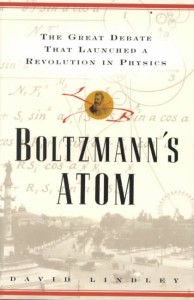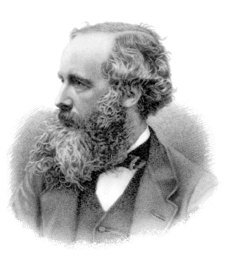 Ludwig Boltzmann was one of the fathers of statistical mechanics, that field of physics that treats large collections of particles and has allowed us to understand how materials, which are large collections of atoms, behave. That atoms comprise everything around us is almost self-evident today, but only about 100 years ago, many scientists did not believe atoms existed. Scientists like Boltzmann postulated atoms to derive theories that could explain, for example, how gases behave when you squeeze them or heat them up, but, at the time, they were a theoretical construct. Sure, earlier scientists and philosophers had speculated on the existence of atoms, all the way back to the ancient Greeks, but no one had ever seen an atom, so building a whole theory on the assumption that atoms exist seemed, to many scientists, the utmost folly. They thought it was pointless to build theories on hypothetical entities that might never be observed.
Ludwig Boltzmann was one of the fathers of statistical mechanics, that field of physics that treats large collections of particles and has allowed us to understand how materials, which are large collections of atoms, behave. That atoms comprise everything around us is almost self-evident today, but only about 100 years ago, many scientists did not believe atoms existed. Scientists like Boltzmann postulated atoms to derive theories that could explain, for example, how gases behave when you squeeze them or heat them up, but, at the time, they were a theoretical construct. Sure, earlier scientists and philosophers had speculated on the existence of atoms, all the way back to the ancient Greeks, but no one had ever seen an atom, so building a whole theory on the assumption that atoms exist seemed, to many scientists, the utmost folly. They thought it was pointless to build theories on hypothetical entities that might never be observed.
In spite of pushback from many established scientists, Boltzmann dedicated his life to developing theories that relied upon the assumption that atoms exist. He was only fully vindicated when Albert Einstein published his paper explaining the origin of Brownian motion, that motion you can see in a microscope in which a particle of pollen, for example, seems to wander randomly around the slide. What caused that motion? Einstein showed it was atoms bombarding the pollen grain from all sides. He did this by using Boltzmann’s theories.
David Lindley’s Boltzmann’s Atom explores the state of physics during the end of the 1800s and how scientists like Boltzmann laid the foundation for modern theories about atoms. Not only did Boltzmann’s work establish some of the pillars of statistical mechanics, but, in some sense, laid the groundwork for the forth-coming quantum revolution. Lindley describes the scientific atmosphere, especially the conflict between pure theorists like Boltzmann and more pragmatic scientists that felt that theoretical physics was not fundamentally science. Ultimately, Boltzmann’s ideas prevailed, but that basic conflict still exists, particularly as modern scientists build theories based on super-strings and membranes, entities that no one knows how we will ever see. The debates we have today about the future of science and whether such theories are really science remind one of the similar debate over atoms.
Not only does Lindley provide a fascinating history of science, but he delves into the life of Boltzmann himself, who was a complicated man. Boltzmann seemed to never be at peace, never happy with the perceived lack of recognition his theories had during his life. He always felt isolated and alone, never in the center of the science world. He always felt like he was missing out, much like the social wallflower that hangs back against the wall at the party. Lindley’s portrayal of Boltzmann and the other scientists of the era shows that scientists are all too human, with their ambitions, egos, and insecurities. That the pillars of such an important branch of physics were such people provides a reality check on how science actually occurs. Breakthroughs aren’t automatically embraced by the community, but often need time to be assimilated, often via the passing of the old guard, before they are truly appreciated. Science, like all human endeavors, can be messy, and the life of Boltzmann highlights this fact.
Having read this accounting of Boltzmann’s life right after that of Alexander Hamilton’s, I am struck by the anxieties we have today. We fret that politics has degenerated or that science is at the cusp of some existential crisis. We always believe that our situation is somehow special, that things are at a tipping point never encountered before. However, reading about these men and their roles in the history of science and the United States, respectively, one cannot but be struck by how little things have changed. Sure, politics are nasty now, but they were nasty way back during the founding. Sure, theoretical physics has an uncertain future, but it did so back when atoms were being discussed. Things are different, but they really aren’t at some level. As they say, those who don’t know their history are doomed to repeat it.

